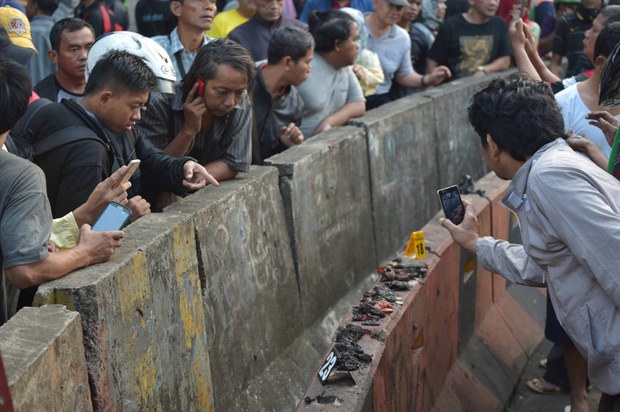Indonesia Says 999 Former Terrorists Have Been Deradicalized
2017.10.19
Jakarta
Updated at 3:05 p.m. ET on 2017-10-20
About 1,000 former terrorists have participated in Indonesia’s deradicalization programs during the past three years, a senior security official said Thursday at a forum marking President Joko Widodo’s third year in power.
Of that number, 266 people participated in the programs while in prison and 733 did so outside of prison, Minister Wiranto said, citing data from the National Counterterrorism Agency (BNPT).
“We are using a soft approach that is more humane, more intelligent, namely that they are re-educated and rehabilitated, and finally reintegrated into society,” he said.
Participants receive coaching and mentoring in civics, religion, life skills and small business development, he said. The government has been using this “soft approach” more frequently than a “hard approach,” which often requires the use of violence, Wiranto said.
He also said 174 suspected terrorists had been tried and convicted during Jokowi’s presidency, while 33 others were on trial. In addition, 69 terror suspects were undergoing investigation; 64 had been freed and 48 died during police raids.
Indonesia, home to the world’s largest Muslim-majority population, has received praise from other nations for curtailing terrorism on its soil with a combination hard-soft approach that is being mimicked abroad, said Wiranto, chief of the coordinating ministry for political, legal and security affairs.
“Although the majority of Indonesians are Muslim and terrorism always uses the mask of Islam, the ratio is very small and the damage from terrorist attacks is even smaller,” he said.
Relatively small
Ridlwan Habib, a terrorism analyst at the University of Indonesia, agreed that the “soft approach” has become more prevalent in the last three years.
“No more shootings like before, such as terrorist suspects being shot during prayer,” he told BenarNews. More terror suspects have been arrested and the number of suspects gunned down while allegedly resisting arrest has declined, he said.
“The scale of attacks is also relatively small, not big like before,” Ridlwan said.
But not all terrorists who participate in deradicalization programs in prison change their ideology, he cautioned, explaining that those people might still be recruiting others behind bars.
About 50 convicted and imprisoned terrorists have not been deradicalized, and they have resisted or declined BNPT programs, he said, making it necessary for security forces to remain vigilant for so-called lone wolf attacks, which are hard to predict.
They “should be trained in global terrorism trends, character evaluation and types of attacks," he said, because all that has changed considerably in recent years.
Jakarta has suffered from extremist attacks. In January 2016, four militants exploded bombs and opened fire inside a shopping mall less than two miles from the presidential palace. The Islamic State (IS) claimed responsibility for the attacks that killed eight people, including the suspects.
More than a year later, two suspected suicide bombers killed three police officers outside a bus terminal in East Jakarta. The attack occurred as officers were overseeing a parade ahead of Ramadan on May 24, one day after IS-linked militants seized the southern Philippine city of Marawi, where an undetermined number of Indonesians joined Filipino fighters in pitched battles against Philippine government forces.
Philippine military officials on Thursday said the Marawi fighting appears to be nearing an end, as they claimed to have killed three pro-IS leaders in fighting that has killed more than 1,000 people, including 824 militants, 162 soldiers and at least 47 civilians.
IS members resist government programs
Taufik Andrie, director of the Institute for International Peacebuilding in Jakarta, told BenarNews that while the deradicalization figure seems large, “there are former terrorism convicts who have not been touched by the program.”
He cited individuals released from jail between 2005 and 2011, before the BNPT was formed.
Taufik said 266 convicts affiliated with extremist groups are behind bars. Many of them reject government intervention programs, he said.
“If the ultimate goal is a person’s change of mindset from radical to moderate, the number of people who have reached that point is statistically small and limited,” he said.
Still, the government’s soft approach is quite good, he said.
“Humanitarian-based approaches and economic empowerment are beginning to look successful, although they have not reached all potential beneficiaries,” he said.
And while suspects still die during arrest attempts, the number is decreasing, he said.
“Handling armed terrorist groups is complex, because persuasion alone is not enough. It needs a measured approach," he said. "Statistically, it’s getting better. ... The use of violence that violates human rights is beginning to decrease."








